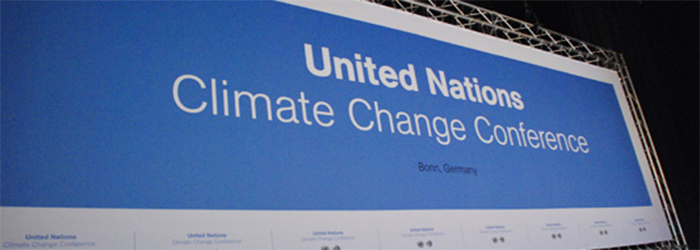Informing international negotiations about pathways of greenhouse gas emissions
Researchers at the ESRC Centre for Climate Change Economics and Policy have explored pathways for annual emissions of greenhouse gases that will allow the world to avoid dangerous climate change.
The research by Professor Lord Stern of Brentford, Dr Nicola Ranger and Dr Alex Bowen was extremely influential in informing the United Nations climate change conferences in 2009 and 2010.
The 15th session of the Conference of the Parties (COP15) to the United Nations Framework Convention on Climate Change (UNFCCC) was held in Copenhagen in December 2009.
In the lead-up to COP15, the Centre’s researchers investigated how annual global emissions would need to be reduced by 2020 and beyond in order to avoid dangerous climate change.
In December 2009, ahead of the start of COP15, Dr Bowen and Dr Ranger published a policy brief outlining which pathways for future annual emissions of greenhouse gases would be consistent with the goal of having about 50 per cent chance of avoiding a rise in global average temperature of more than 2ºC above its pre-industrial level.
Dr Ranger and Dr Bowen also outlined their work in a research paper for the AVOID programme, funded by the UK Government.
Using the analysis by Dr Ranger and Dr Bowen, Professor Lord Stern suggested that countries should agree to reduce global annual emissions from 47 billion tonnes of carbon-dioxide-equivalent in 2010 to about 44 billion tonnes in 2020 in order to be consistent with the target of limiting global warming to no more than 2ºC.
The results of the research were promoted to the media and widely disseminated to key policy-makers. The UK Government embraced the results, and the Prime Minister, Gordon Brown, also called for annual global emissions to be reduced to 44 billion tonnes of carbon-dioxide-equivalent by 2020.
On the first day of COP15, Professor Lord Stern and colleagues released an analysis, carried out jointly with the UK Government and the United Nations Environment Programme, showing that national commitments for emissions reductions in 2020 collectively would exceed the overall target of 44 billion tonnes.
The research was launched at a press conference and received media coverage across the world.
The Parties at COP15 eventually agreed a decision acknowledging the need to reduce annual emissions sharply to avoid global warming of more than 2ºC, stating:
“We agree that deep cuts in global emissions are required according to science, and as documented by the IPCC Fourth Assessment Report with a view to reduce global emissions so as to hold the increase in global temperature below 2 degrees Celsius, and take action to meet this objective consistent with science and on the basis of equity. We should cooperate in achieving the peaking of global and national emissions as soon as possible, recognizing that the time frame for peaking will be longer in developing countries and bearing in mind that social and economic development and poverty eradication are the first and overriding priorities of developing countries and that a low-emission development strategy is indispensable to sustainable development.”
As a result of their work, Dr Ranger and Dr Bowen were invited in 2010 to contribute to an initiative launched by the United Nations Environment Programme to explore the ‘emissions gap’.
They carried out further research, in collaboration with the UK Met Office, on how annual emissions would need to be reduced in order to avoid global warming of more than 1.5ºC, and published their results in a policy brief in August 2010.
The work was also submitted for publication as a research paper, which appeared in the journal ‘Climatic Change’ in 2012.
The first report from the project was published in November 2010, ahead of the 16th session of the Conference of Parties (COP16) to the UNFCCC, held in Cancún, Mexico.
The Parties agreed a decision that acknowledged the need to explore whether a target of avoiding warming of more than 1.5ºC should be adopted:
“Further recognizes that deep cuts in global greenhouse gas emissions are required according to science, and as documented in the Fourth Assessment Report of the Intergovernmental Panel on Climate Change, with a view to reducing global greenhouse gas emissions so as to hold the increase in global average temperature below 2 °C above pre-industrial levels, and that Parties should take urgent action to meet this long-term goal, consistent with science and on the basis of equity; also recognizes the need to consider, in the context of the first review, as referred to in paragraph 138 below, strengthening the long-term global goal on the basis of the best available scientific knowledge, including in relation to a global average temperature rise of 1.5 °C”.
Dr Ranger and Dr Bowen also contributed to an update of the ‘emissions gap’ report in 2011, which was acknowledged in the decision reached at the 17th session of the Conference of the Parties to the UNFCCC in Durban, South Africa, in December 2011:
“Noting with grave concern the significant gap between the aggregate effect of Parties’ mitigation pledges in terms of global annual emissions of greenhouse gases by 2020 and aggregate emission pathways consistent with having a likely chance of holding the increase in global average temperature below 2 °C or 1.5 °C above pre-industrial levels”.



